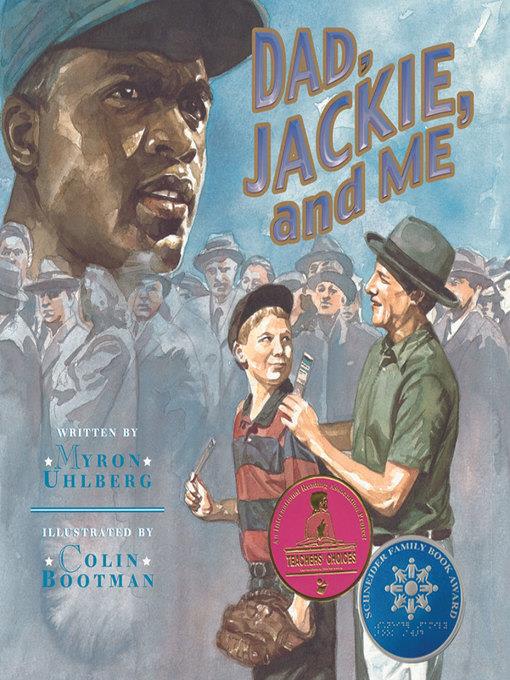
Dad, Jackie, and Me
فرمت کتاب
ebook
تاریخ انتشار
2011
Lexile Score
610
Reading Level
2-3
ATOS
3.8
Interest Level
K-3(LG)
نویسنده
Colin Bootmanشابک
9781561456048
کتاب های مرتبط
- اطلاعات
- نقد و بررسی
- دیدگاه کاربران
نقد و بررسی

February 7, 2005
Uhlberg's (Flying Over Brooklyn
) moving text and Bootman's (Papa's Mark
) realistic, period watercolors introduce the narrator, an avid young baseball player and fan of the Brooklyn Dodgers. In 1947, the Dodgers have just acquired Jackie Robinson, and the boy's father, who is deaf, comes home with two tickets to see the Dodgers play. Though the man has never shown an interest in the sport, soon after the game, the eager-to-learn man grills his son about the sport and about Robinson, and each night attempts to play catch with the boy. Though Bootman's portraits of father and son can be uneven, his close-ups of Robinson consistently convey the athlete's poise and calm under fire. The tale focuses less on the specifics of the season and more on the link between Robinson and the boy's deaf father overcoming obstacles; in many ways the concluding author's note tells the more poignant side of the autobiographical points to the story. But most readers will be thrilled by the book's climax: when Robinson catches a ball to make the last out of the season, he throws the ball to the boy's father, who, for the first time in his life, catches a baseball. Ultimately, this is an affecting tribute to Robinson, to a dedicated son and to a thoughtful, deep-feeling father. And, of course, to baseball. Ages 4-8.

May 1, 2005
Gr 2-5 -Like The Printer (Peachtree, 2003), this story is based on Uhlberg's experiences growing up as a hearing child of deaf parents. The tale is set in Brooklyn in 1947, where a young Dodger fan eagerly anticipates the much-heralded addition of Jackie Robinson to his team's lineup. Surprisingly, the narrator's deaf father is interested too; he has recognized his own struggle for respect and acceptance mirrored in Robinson's triumph. The two begin attending games and keep a scrapbook of newspaper clippings about the first baseman. Though baseball and Robinson are at the heart of this story, its strength lies in its depiction of the bond between father and son. It is evident that their relationship is characterized by respect and tenderness, though, at the ballpark, the boy is at first embarrassed when his father's awkward cheer causes other fans to stare. The page design resembles a scrapbook, with actual newspaper clippings on the endpapers. Bootman's lovely watercolor paintings add detail and wistful nostalgia. Baseball fans may be disappointed with the narrative's slow pace and the fact that Robinson is little more than an iconic figure, but others will appreciate the story's insightful treatment of deafness as viewed through the eyes of a child. -"Marilyn Taniguchi, Beverly Hills Public Library, CA"
Copyright 2005 School Library Journal, LLC Used with permission.

August 1, 2005
Gr. 2--4, younger for reading aloud. Following in the tradition of Bette Bao Lord's " n the Year of the Boar and Jackie Robinson" (1984), about a young Chinese immigrant to Brooklyn in 1947 who identifies with the travails of the rookie Dodger first baseman, Uhlberg tells another story of an outsider who feels a bond with Robinson. This outsider, though, is a real-life figure, the author's deaf father, who saw in the African American Robinson's stoic endurance of prejudice on and off the field a parallel to his own experience as a deaf man. It takes the young Uhlberg, narrator of the story, a while to overcome his embarrassment at his father's attempts to cheer for Robinson ("AH-GEE, AH-GEE," the deaf man yells from the Ebbetts Fields grandstand, attempting to say Jackie), but eventually Dad's devotion wins the day in a moving finale. Colin Bootman, who earned a Coretta Scott Honor Award for " Almost to Freedom" (2003), uses evocative watercolors rich in soft browns and lush greens to capture both the feel of the 1940s (fedora-wearing fans) and the electricity of Robinson's play.(Reprinted with permission of Booklist, copyright 2005, American Library Association.)

























دیدگاه کاربران